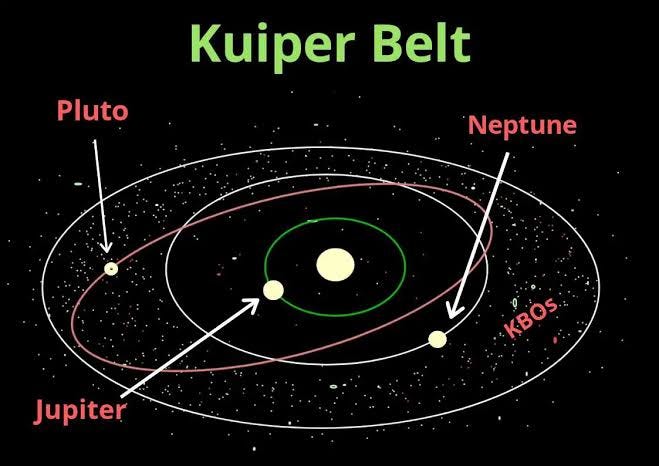What Happened To Pluto?
What happened to Pluto????
Toluwani Ahmed
·
Following
3 min read
·
January 8, 2023 The Kuiper Belt
The Kuiper Belt
Every year since 2006, August 24th, otherwise known as “Pluto demoted day”, has been a day for Astronomers to commemorate our once beloved but misunderstood ninth planet, Pluto’s change of status to dwarf planet. A development that brought great sadness to many Pluto lovers, including myself.
But why is Pluto no longer a planet? It’s kind of complicated.
Pluto’s size is very small for a planet. It is in fact smaller than Earth’s moon, as well as a few of the moons of Saturn and Jupiter, and has a surface area just a little bit greater than that of Russia. However, this very small size is not exactly the reason Pluto was denied its Planetary status. For that we’d have to go all the way down memory lane, back to Sir Isaac Newton.
Isaac Newton was just built different. A man far ahead of his time. When he arrived on the scene, he changed the whole game. He popularised the modern scientific method of determining the authenticity of scientific fact, invented calculus, and postulated several physical and mathematical laws and theories, but more importantly for our topic of discussion, the Law of Gravitational attraction. This law was so effective that at the time, it could predict the orbit of the planets going around the sun, moons around their planets etc. It was based on his law of Gravity that Neptune and Pluto were discovered, years after Newton’s death. How, you might ask?
Well, before they were discovered, it was observed that Uranus (pronounced Yu-ran-us, not..…oh never mind), which was the furthest discovered planet from the sun at the time, was orbiting the Sun in a way that seemed to deviate from Newton’s laws. Several possible reasons were given as to why this was happening. Some scientists even believed that at great distances, Newton’s laws broke down. Another possibility though, was that the gravity of another undiscovered planet may be tugging on it and affecting its gravity. Several Astronomers made calculations on the possible position of this undiscovered Planet and its possible size, and on September 23rd, 1846, at the Berlin observatory, Neptune was discovered by Johann Gottfried Galle based on the mathematical prediction made by Urbain Le Verrier.
Years later, Neptune was also observed to have a weird orbit around the sun, and since the Astronomers of the time were familiar with the game, using the Uranus template, Pluto was discovered in 1930.
Pluto being the Ninth planet was a misunderstanding. Yes, it was a round celestial body orbiting the Sun like the other 8 planets, it was discovered to be sharing it’s orbit with other Pluto-like dwarf planets in a region of space known as the Kuiper belt.
It became general consensus that these relatively small icy bodies of the Kuiper belt, which include Pluto were very different from the other 8 planets. The 8 planets had orbits of their own, and cleared every moon, asteroid, comet etc out of their orbit. Pluto and it’s comrades of the Kuiper belt however, seemed to Jam-pack themselves in the outskirts of the solar system and therefore had to have their own classification. It was for this reason that that International Astronomical Union (IAU) announced to the world that our beloved Pluto could no longer be called the Ninth Planet.











































